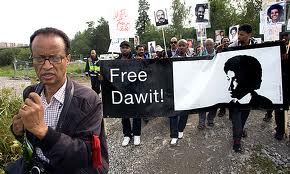Press watchdog files complaint in Sweden against Eritrea
By AFP
 Sweden’s chapter of Reporters Without Borders (RSF) filed a complaint Wednesday with prosecutors accusing Eritrea’s regime of human rights abuses over the imprisonment of Swedish-Eritrean journalist Dawit Isaak in 2001.
Sweden’s chapter of Reporters Without Borders (RSF) filed a complaint Wednesday with prosecutors accusing Eritrea’s regime of human rights abuses over the imprisonment of Swedish-Eritrean journalist Dawit Isaak in 2001.
The complaint was directed at Eritrean President Isaias Afwerki and seven other high ranking political leaders, including Foreign Minister Osman Saleh Mohammed.
Handed over to Swedish police by RSF and Isaak’s brother, the complaint accused them of “crimes against humanity, enforced disappearance, torture and kidnapping”.
It was also signed by human rights advocates like Nobel Peace Prize laureate Shirin Ebadi and former United Nations High Commissioner for Human Rights Navi Pillay.
On September 23, 2001, Isaak was arrested shortly after the Eritrean newspaper he founded, Setit, published articles demanding political reforms.
According to RSF, he and his colleagues detained at the same time are now the journalists who have been imprisoned the longest in the world.
Isaak had fled to Sweden in 1987 during Eritrea’s struggle against Ethiopia which eventually led to independence in 1993. He returned in 2001 to help shape the media landscape.
RSF ranks Eritrea as the world’s third most repressive country when it comes to press freedom, behind North Korea and Turkmenistan.
Similar complaints have been filed before, including in 2014 when a new law took effect in Sweden enabling the prosecution for such crimes even if committed elsewhere in the world.
The prosecutor-general at the time concluded that while there were grounds to suspect a crime and open an investigation, doing so “would diminish the possibility that Dawit Isaak would be freed.”
Bjorn Tunback, coordinator for RSF Sweden’s work on the Dawit Isaak case, said they hoped this time would be different after Foreign Minister Ann Linde last year said that despite repeated calls for Isaak’s release “no clear changes are yet to be noted in Eritrea.”
Tunback said the minister’s statements indicated that diplomatic channels had been exhausted.
“Diplomacy has its course, but when that doesn’t lead anywhere, there is also the legal route,” Tunback told AFP.
“The law is there to protect individuals… and that is what we’re testing now.”
Short URL: https://english.farajat.net/?p=11380















